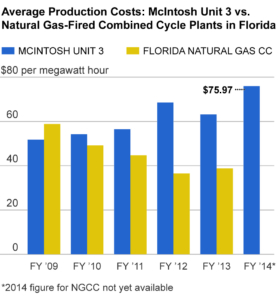Study Concludes Costly Coal Plant In Lakeland, Fla., Should Be Retired In Favor Of Solar Expansion And Energy-Efficiency Initiatives

CLEVELAND, Sept. 30, 2015 (IEEFA.org) —The Institute for Energy Economics and Financial Analysis (IEEFA) released a report today concluding that Lakeland Electric and the Orlando Utilities Commission should retire the coal-burning C.D. McIntosh Jr. Unit 3 power plant and focus instead on less expensive renewable-energy development and energy-efficiency programs.
“The retirement of McIntosh Unit 3 at any time in the near future would not reduce regional electric-grid reliability,” said David Schlissel, IEEFA’s director of resource planning analysis and lead author of the report. “Even without this coal plant, there would be more than enough generating capacity in the state to serve projected system loads while providing the 15 percent capacity reserve margin that is needed to allow for unexpected power plant outages and unanticipated high system loads.”
“In addition to skyrocketing operating costs, the coal plant’s joint owners, Lakeland Electric and the Orlando Utilities Commission, have made more than $70 million in capital expenditures in the past five years to replace or upgrade plant equipment and components,” Schlissel added (additional commentary here). “Further capital expenditures can be expected in future years as the unit ages if it remains online.
C.D. McIntosh Unit 3 is a 33-year-old, 364-megawatt coal-burning generator in the City of Lakeland, Fla. It shares the site with several other generating units, including a newer natural-gas-fired combined-cycle plant. The coal-burning generator is 60 percent owned by Lakeland Electric and 40 percent by the Orlando Utilities Commission. Today’s report confirms findings in Lakeland Electric’s own Strategic Resource Plan that continuing to burn coal at Unit 3 will not yield “any material strategic advantages,” especially given more protective public health and environment safeguards.
IEEFA’s study, commissioned by the Southern Alliance for Clean Energy, finds that C.D. McIntosh’s Unit 3 operating costs increased on average by 33 percent from 2009 to 2013.
Additional findings from the report:
- A reasonable resource strategy for both Lakeland Electric and the Orlando Utilities Commission would be to retire McIntosh Unit 3 and, in the short term, purchase any needed replacement power from excess capacity at existing natural-gas-fired combined-cycle plants, while aggressively promoting investments in energy conservation and solar photovoltaic resources.
- This strategy would enable Lakeland Electric and the Orlando Utilities Commission to retire McIntosh Unit 3 without increasing their long-term dependence on natural gas.
- Development of solar photovoltaic energy in Florida, the U.S. state with the third–highest potential for solar energy, will reap long-term benefits for the municipal utilities and their ratepayers.
- Energy efficiency also is a very low-cost alternative to continued operation of McIntosh Unit 3 that will reap benefits for the utilities and their ratepayers.
Schlissel said Unit 3 has underperformed largely as a result of its unreliable operations and because of competition from less expensive power sources in Florida. Unit 3 is unlikely to regain any of this lost generation because the state has a significant amount of excess, low-cost natural-gas-fired generation and the price of installing new solar resources continues to decline.
Amelia Shenstone, campaigns director for the Southern Alliance for Clean Energy said, “Across the southeastern states, we’re seeing that coal plants are no longer an economic choice, and that phasing them out can protect ratepayers as well as clean air, clean water, and public health. This report shows that retiring Plant CD McIntosh Unit 3 is a win-win opportunity for its operators.”
John Ryan, a local Sierra Club lead, received the report as welcome news. “Lakeland Electric’s recent investment in a solar power plant at Bella Vista is an important step toward clean energy,” Ryan said. “The report released today shows that moving Lakeland off of dirty, polluting coal and investing more in clean, renewable energy would benefit the local economy and public health.”
Media contacts: Amelia Shenstone 404.373.5832 x3 and Karl Cates 917.439.8225
The Cleveland-based Institute for Energy Economics and Financial Analysis (IEEFA) conducts research and analyses on financial and economic issues related to energy and the environment. The Institute’s mission is to accelerate the transition to a diverse, sustainable and profitable energy economy and to reduce dependence on coal and other non-renewable energy resources.














